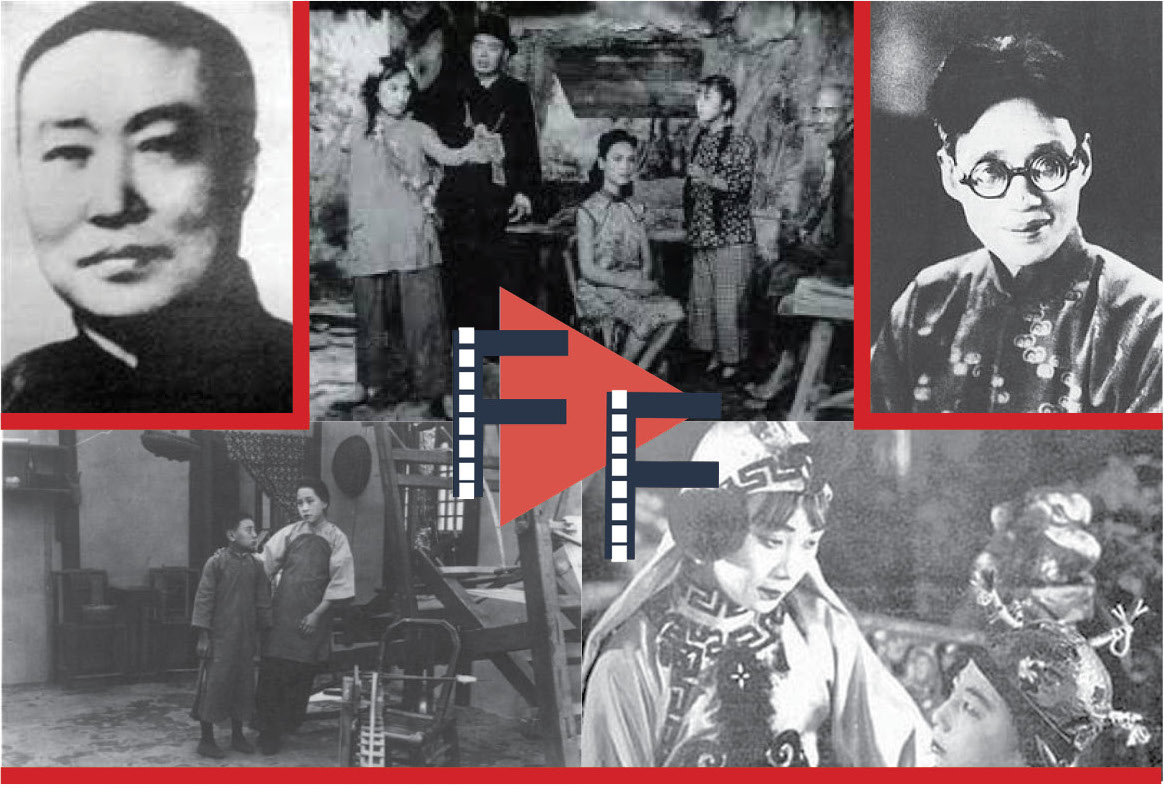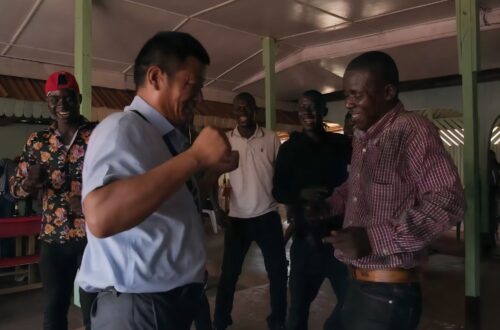Zhang Shichuan and Zheng Zhengqiu: The unlikely duo who pioneered Chinese cinema

History now remembers Zhang Shichuan, a businessman, and Zheng Zhengqiu, an intellectual, as two of the key founding fathers of Chinese cinema. Their story could well be a film in itself.
(Top images, clockwise from upper left: Zhang Shichuan, The Difficult Couple, Zheng Zhengqiu, The Burning of Red Lotus Temple, Orphan Rescues Grandpa)

Shanghai filmmakers Zhang Shichuan 张石川 and Zheng Zhengqiu 郑正秋 weren’t the first men in China to make movies. When the two friends began to collaborate in 1913, Westerners had introduced film to China years earlier, while their countryman Ren Qingtai 任庆泰 shot eight shorts adapted from Peking Opera between 1905 and 1909. At a time when foreigners dominated film in China, however, Zhang and Zheng’s partnership managed to create Chinese movies for Chinese audiences. Their work The Difficult Couple 难夫难妻 marked a milestone in 1913, being the first feature-length Chinese movie, and their collaboration would shape the Chinese film industry well into the 1930s.

When Zhang and Zheng began making movies, there was no such thing as film school. The two pioneers, in fact, began their careers in very different modes of life. Zhang hailed from Ningbo, where he dropped out of school as a teenager after the death of his father. He moved to Shanghai to work with his uncle, a comprador who set him up with a job at an American-owned company. Zheng, on the other hand, was a Shanghai intellectual who had a love for Chinese theater. He worked as a drama critic and journalist, and stood out in the Shanghai theater scene for his extensive knowledge of Peking Opera, as well as his interest in more modern plays.
Given their backgrounds, it might not be surprising that Zheng was the more artistic of the pair, while Zhang was more concerned with making money.
Zhang wasn’t much interested in movies to begin with, but joined the American-owned Asia Film Company as a consultant in 1913. When the American owners became interested in adapting a play popular in Shanghai during the time, they asked Zhang to approach Zheng, hoping he could introduce them to the play’s actors. While the adaptation never happened, Zhang’s visit to Zheng at his house marked the beginning of their partnership. They worked together at Asia Film Company, creating what is generally considered the first Chinese feature film, The Difficult Couple. As would become their routine, Zhang handled the role of director, and Zheng wrote the movie’s script. Zheng’s screenplay, a drama about a man and woman forced into an arranged marriage by their families, is also credited with being the first Chinese film ever made with a script.
The movie was a success, but Zhang and Zheng’s careers at the Asia Film Company didn’t last long. World War I made getting film stock difficult, and the studio opted to close its doors in 1914. Zhang and Zheng retreated into managing theater troupes for a while, but they also kept themselves busy with other ventures, such as running a newspaper and publishing house with their friend Zhou Jianyun 周剑云. In 1916, Zhang tried his hand at filmmaking again and established the Huanxian Film Company. The company’s first (and only) movie was a flop, and Zhang ended up managing an amusement park before founding a stock exchange in 1921. This turned out to be an equally bad idea; Shanghai experienced a stock market bubble, and the number of stock exchanges in the city dwindled from 112 in November 1921 to just 12 in March 1922.
Quitting the stock game, Zhang decided to give the film industry yet another go. This time, Zhang teamed up with Zheng and several other friends to establish a new film company: Mingxing. Zhang and his partners had ambitious plans, and they even launched an acting school to find and train talent. They were determined to make movies that could not only compete with American and European productions, but would educate and entertain ordinary audiences. Zheng, in particular, especially believed that film could be used to enlighten and reform society. Despite his partner’s convictions, however, Zhang insisted that the studio play it safe and make commercial comedies.
That same year in 1922, Mingxing released its first couple of movies, a trilogy of shorts heavily influenced by American comic stars like Charlie Chaplin and Harold Lloyd. These were directed by Zhang and written by Zheng, and while the second short, Laborer’s Love 劳工之爱情, was more distinctly Chinese in character, Chinese filmgoers were mostly indifferent. Mingxing was on thin ice before Zhang gave in to Zheng, and the pair released a socially-conscious drama called Orphan Rescues Grandpa 孤儿救祖记 in 1923. The movie was much more serious than Mingxing’s initial efforts; its hero is a little boy who’s estranged from his paternal side of the family after his grandfather disowns his mother. Years later, the boy unknowingly meets his grandfather, who turns out to be the founder of his school. The two grow closer together, and true to the title, the boy saves his grandpa before he’s hurt by the movie’s villain.
Orphan Rescues Grandpa proved to be just the hit that Mingxing needed, and it was so successful that the studio was inspired to release other movies with moral messages. After a rocky beginning, Mingxing would actually become one of the three biggest Chinese film studios of the era. They could make didactic movies like Orphan Rescues Grandpa, but they also dabbled in more sensationalist genre fare.
https://www.youtube.com/watch?v=MDgk930Mh8o
In 1928, Zhang and Zheng had a major hit on their hands with The Burning of Red Lotus Temple 火烧红莲寺, a wuxia epic that spawned 17 sequels in less than three years. Although the series is lost today, it was a great sensation during the time, leading to China’s first boom in wuxia movies. Ordinary moviegoers were enraptured by its action scenes and special effects, although authority figures and intellectuals were less impressed.
By 1931, the popularity and influence of movies like The Burning of Red Lotus Temple had caused such a panic that the Chinese government banned the wuxia genre, accusing it of promoting superstition.
Complaining about the popularity of the series, the left-wing novelist Mao Dun 茅盾 noted that excited audience members applauded, shouted, and screamed during screenings of Red Lotus Temple. “If you must cite an example of a Chinese film that can affect an audience’s emotions,” he wrote, “then cite The Burning of the Red Lotus Temple.” Some overzealous fans even ran away from home to go to Sichuan’s sacred Mount Emei, where they planned to learn the sort of supernatural kung-fu demonstrated in the series. By 1931, the popularity and influence of movies like The Burning of Red Lotus Temple had caused such a panic that the Chinese government banned the wuxia genre, accusing it of promoting superstition.
That same year, Zhang directed Sing-Song Girl Red Peony 歌女红牡丹, the first sound film ever made in China. It was another box office triumph for Mingxing, and the rest of the decade would see the studio produce a handful of Chinese classic films. In the summer of 1932, the studio also began to adapt a more leftist tone. Spring Silkworms 春蚕 (1933), for example, attacked Western economic imperialism and rural poverty, while Twin Sisters 姊妹花 (1934) — directed and written by Zheng — had a story about class conflict. In 1934, an all-star team of Mingxing filmmakers, including Zhang and Zheng, collaborated on The Classic for Girls 女儿经, a feminist-tinged anthology about a group of old classmates who remember their lives over a dinner party.
https://www.youtube.com/watch?v=rSk7-flJRLg
While the 1930s marked the highpoint of Zhang and Zheng’s studio, it was also the beginning of the end for Mingxing. The first blow came in 1935, when Zheng fell sick and died. To make matters worse, Mingxing ran into financial difficulty and censorship issues around the same time. Still, the studio soldiered on, making ambitious reforms and opening up a second studio. Despite its best efforts, Mingxing’s undoing would come from the outside, with the outbreak of the Second Sino-Japanese War in 1937. The Japanese invasion of Shanghai forced Zhang to stop production at Mingxing, and in 1939, the studio was closed for good after it was destroyed by a fire.
For Zhang, Mingxing represented a lifetime of work. He was devastated, and the war made working in the film industry even more difficult. Zhang was able to work again, but it was a double-edged sword, as a manager and director in the Japanese-controlled China United Film Production Corporation. It might have been eyebrow-raising for a leftist and patriot like Zhang to accept this kind of work, yet a number of Chinese filmmakers with similar views worked for the Japanese at the time. Some of these men left the war with their reputations unscathed, but Zhang wasn’t nearly as lucky. He was publicly accused of being a traitor, and while he wasn’t imprisoned or executed, the charge essentially killed his career. For the last few years of his life, Zhang bounced between work in Hong Kong and Shanghai before his death in 1953, his reputation still tarnished.
Sixty years later, history has been kinder to Zhang Shichuan’s memory, and today he and his partner Zheng Zhengqiu are considered two of the key founding fathers of Chinese cinema. Together, they revolutionized the Chinese film industry, founding one of the most influential studios in the history of Chinese cinema. Granted, perhaps Zhang was a bit too greedy, and Zheng a bit too preachy, but there’s no denying the amount of joy and entertainment these two pioneers brought to the moviegoers of their country.
Film Friday is The China Project’s film recommendation column. Have a recommendation? Get in touch: editors@thechinaproject.com





